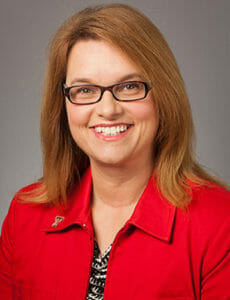All papers accepted for publication in the research journal are automatically nominated for this award. The winning paper will include a thorough and appropriate review of the literature of the topic addressed. Sound research methodologies must be employed and include sound operational definitions, appropriate measuring devices, and adequate statistical analyses. The successful paper will also provide creative and innovative approaches to using the information in practice.
2024 Research Journal Article: “Could Coaching Improve Consumer Credit Use Behavior? Evidence From a State Program”
Congratulations to winners of the AFCPE® Outstanding Research Journal Article!
2024: “Could Coaching Improve Consumer Credit Use Behavior? Evidence From a State Program”
Journal of Financial Counseling and Planning, Volume 34 Issue 3
Theodos, B., Teles, D., & Docter, B. (2023)
Published in the Journal of Financial Counseling and Planning, this paper examines the impact of financial coaching on consumer credit behavior. The research highlights improvements in delinquent account resolution, credit utilization, and debt management, showcasing the potential of state-supported financial coaching programs.
2023: The value of financial education during multiple life stages.
Journal of Financial Counseling and Planning, Volume 33 Issue 1, April 2022
Philip Gibson, Janine K. Sam, and Yuanshan Cheng
The authors examine the timing of financial education and its impact on short-term and long-term financial behavior. They also explore the power of financial education on financial knowledge, examine the link between financial knowledge and positive financial behavior, and cite implications for all financial education advocates.
2022: Can Workplace Financial Counseling Help Lower-Income Workers Improve Credit Outcomes?
Journal of Financial Counseling and Planning, Volume 32 Issue 3
Mathieu R. Despard, Yingying Zeng, Sophia Fox-Dichter, Ellen Frank-Miller, and Michal Grinstein-Weisse
Financial counseling has been found to be effective in improving consumers’ credit outcomes and could be expanded through the workplace to reach lower-income workers who struggle with various financial challenges.
We examine engagement and credit outcomes associated with a workplace financial counseling program offered to 2,849 frontline workers in New York City. Age and credit scores helped explain variation in types of engagement in services. Credit outcomes were modest on average, but greater among workers who received three or more counseling sessions, had low and no baseline credit scores, and reduced the number of delinquent and collections accounts on their credit reports. Workplace financial counseling is a promising strategy to proactively promote credit outcomes among frontline workers, though counselors should be flexible in offering services and help workers access affordable credit products available to those with subprime credit scores and increase financial slack to lessen dependence on credit.
2021: Use of visualization tools to improve financial knowledge: An experimental approach
 D. Elizabeth Kiss, CFP® is an associate professor and extension specialist in the Department of Personal Financial Planning at Kansas State University. In this position, she assists in the development and delivery of a statewide Cooperative Extension program focused on developing the financial knowledge and skills for sound financial decision-making of Kansans. She supports the work of Extension agents across the state by providing linkages to current research, educational resources, and statewide and national organizations. Her expertise is in framing, developing, and evaluating extension educational programs in the areas of family resource management, family and consumer economics, and personal finance. In addition to traditional delivery methods, her programming efforts have also included social marketing campaigns and online educational challenges.
D. Elizabeth Kiss, CFP® is an associate professor and extension specialist in the Department of Personal Financial Planning at Kansas State University. In this position, she assists in the development and delivery of a statewide Cooperative Extension program focused on developing the financial knowledge and skills for sound financial decision-making of Kansans. She supports the work of Extension agents across the state by providing linkages to current research, educational resources, and statewide and national organizations. Her expertise is in framing, developing, and evaluating extension educational programs in the areas of family resource management, family and consumer economics, and personal finance. In addition to traditional delivery methods, her programming efforts have also included social marketing campaigns and online educational challenges.
 As a practitioner and researcher, Michael J. Kothakota, PhD, CFP® is a dedicated financial planner who uses evidence-based approaches. Michael’s approach is guided by a core belief that financial planning professionals’ efforts on behalf of clients should be driven by data and a deep understanding of the field.
As a practitioner and researcher, Michael J. Kothakota, PhD, CFP® is a dedicated financial planner who uses evidence-based approaches. Michael’s approach is guided by a core belief that financial planning professionals’ efforts on behalf of clients should be driven by data and a deep understanding of the field.
Michael is committed to applying the science of financial planning to help his clients accomplish their goals.
Prior to WolfBridge Wealth, Michael worked for a large national financial services firm. His extensive experience and education have enabled him to provide exceptional financial planning services. In addition, he has provided support and planning to hundreds of individuals and families. Michael teaches Foundations of Wealth Management at Columbia University and is also a Professor of Practice at Kansas State University, where he teaches Statistics and Statistical Programming.
Outside of the office, Mike enjoys reading, exercising, playing with the family dog and baking (bread, in particular).
2020: “Financial Transparency Scale: Its development and potential uses.”

Emily Koochel, MS, PhD is an Assistant Professor of Human Development and Family Studies at Michigan State University. Dr. Koochel’s research interest is centered on financial transparency among intimate partners and the role of financial socialization, communication, and trust. This multidisciplinary approach focuses on generating and disseminating preventative and intervention financial education programs for couples and families and informing practitioners and researchers of best practice.
Melinda Stafford Markham, MS, PhD is an Associate Professor in the Department of Applied Human Services at Kansas State University. Dr. Markham’s program of research focuses on relationships following divorce and separation, with particular interest in the coparenting relationship between former partners who continue to parent together from separate households. She also investigates the ways in which communication technology aides in communication between former partners and between parents and children from a distance.
Duane Crawford, MA, PhD was a Professor of Human Development and Family Studies at Kansas State University.
Kristy Archuleta, MS, PhD is a Professor or Financial Planning, Housing and Consumer Economics at University of Georgia. Dr. Archuleta has an established international reputation in the area of financial therapy. This area integrates psychological, relational, and financial factors affecting individual, couple, and family well-being.
2019: “The Impact of Financial-Aid Format on Students’ Collegiate Financing Decisions”

Mac Festa is an Assistant Professor of Accounting in the Department of Accounting and Finance at the University of Wyoming. Mac earned his Ph.D. from West Virginia University in 2017. Mac’s research interests include lending, supervisory roles, and ethics. Prior to entering academia, Mac worked as an analyst in commercial banking.
Kip Holderness, MA is an Assistant Professor at West Virginia University.
Presha Neidermeyer is the Associate Provost for Academic Personnel, overseeing the promotion and tenure process for the entire University, including Health Sciences, and is responsible for processes relating to faculty awards, sabbatical leaves, salary enhancements, development and grievances. Her research is in the area of gender and cultural issues, particularly as they relate to accounting and negotiation.
Ade Neidermeyer is a Professor in the Accounting department
at West Virginia University.
2018: “Future Orientation and Household Financial Asset Liquidity”
 David Allen Ammerman is Assistant Professor of Finance in the Paul and Virginia Engler College of Business at West Texas A&M University . Allen earned his M.S. in Finance from Georgetown University, and his Ph.D. in Personal Financial Planning from Kansas State University. Allen teaches courses in corporate finance, securities analysis and financial modeling, and personal finance. Allen’s research interests include household debt, collective decision-making, financial education, and issues at the intersection of household and business finance. At present, Allen’s work focuses on improving the quality of personal financial advice by adapting principles and theories of corporate finance to the household so that household borrowing and saving can be understood in terms of household capital structure and working capital management. Allen has been invited to present at several national conferences and has authored several papers and articles for publication. Allen has won awards for his innovative approach to researching household finance, including the CFP(r) Board Financial Planning Paper Award at the 2017 meeting of the American Council on Consumer Interests (ACCI). In addition to being a member of AFCPE, Allen is also a member of ACCI and the Academy of Financial Services (AFS).
David Allen Ammerman is Assistant Professor of Finance in the Paul and Virginia Engler College of Business at West Texas A&M University . Allen earned his M.S. in Finance from Georgetown University, and his Ph.D. in Personal Financial Planning from Kansas State University. Allen teaches courses in corporate finance, securities analysis and financial modeling, and personal finance. Allen’s research interests include household debt, collective decision-making, financial education, and issues at the intersection of household and business finance. At present, Allen’s work focuses on improving the quality of personal financial advice by adapting principles and theories of corporate finance to the household so that household borrowing and saving can be understood in terms of household capital structure and working capital management. Allen has been invited to present at several national conferences and has authored several papers and articles for publication. Allen has won awards for his innovative approach to researching household finance, including the CFP(r) Board Financial Planning Paper Award at the 2017 meeting of the American Council on Consumer Interests (ACCI). In addition to being a member of AFCPE, Allen is also a member of ACCI and the Academy of Financial Services (AFS).
Maurice MacDonald received his Ph.D. in economics, from the University of Michigan. He is Professor of Personal Financial Planning in the Kansas State University College of Human Ecology. As a department Chair at Iowa State University, and then Kansas State University, MacDonald’s appointment included 25% time in Extension administration and research. His scholarship in family economics spans from measures of personal and family economic well-being and income adequacy to intergenerational wealth transfer, and the economic status of children, college students and the oldest old. MacDonald has received research grants from the U.S. Department of Agriculture, National Institute of Child Health and Development, National Institute of Mental Health, and the National Institute on Aging. His work has also won him several awards for teaching, administration and research. He has published more than 75 articles, chapters, and technical reports. His book, “Food, Stamps and Income Maintenance,” made his mark as a national expert in the area of economics of welfare and food assistance.
2017: “Financial software use and retirement savings”
 Dr. Qianwen Bi is an assistant professor in the Personal Financial Planning program at Utah Valley University’s Woodbury School of Business. She has been teaching financial planning software in the classroom for over 5 years and has been leading the Technology Applications curriculum in the Personal Financial Planning course at Utah Valley University for the past two years. Having taught the technology course for many years, Qianwen focuses her research on the impact of financial technology in the financial planning industry. Her recent article “The Efficacy of Publicly-Available Retirement Planning Tools” has been downloaded over 2,950 times within five days and made the Social Science Research Network (SSRN) Weekly Top 5 list. The paper has been cited on the Wall Street Journal and also mentioned by other finance-related medias. Dr. Bi holds a Ph.D. in Personal Financial Planning from Texas Tech University. She also holds a M.B.A degree from Rawls College of Business of Texas Tech University with an emphasize in finance. With her bachelor degree in Management of Information Systems from Dalian Maritime University, Qianwen found her passion to study the impact of technology on the financial services industry. Dr. Bi is called the technology expert in financial planning by her colleagues. She spoke at the Technology Tools for Today (T3) conference panel discussions on three different occasions to share her teaching experience and course developing skills of technology applications classes in the personal financial planning program. Other than that, Qianwen is actively involved in creating financial literacy education programs with professors in China. She recently served as an expert in a financial education program for lower income college students in China. The project is funded by Citi Foundation and the report will be presented at an international conference this summer. Dr. Bi is the coordinator of Chinese related projects in her program. She is now building a financial literacy summer camp for students from other countries to participate. Qianwen has a three-year old daughter Rosie and loves traveling with family to experience different cultures when time allows. Hobbies include basketball and professional badminton. A friend and commentator once said “she looks small but she plays big”. Other than that, Rachel loves singing, dancing, and cooking Chinese food for family and friends.
Dr. Qianwen Bi is an assistant professor in the Personal Financial Planning program at Utah Valley University’s Woodbury School of Business. She has been teaching financial planning software in the classroom for over 5 years and has been leading the Technology Applications curriculum in the Personal Financial Planning course at Utah Valley University for the past two years. Having taught the technology course for many years, Qianwen focuses her research on the impact of financial technology in the financial planning industry. Her recent article “The Efficacy of Publicly-Available Retirement Planning Tools” has been downloaded over 2,950 times within five days and made the Social Science Research Network (SSRN) Weekly Top 5 list. The paper has been cited on the Wall Street Journal and also mentioned by other finance-related medias. Dr. Bi holds a Ph.D. in Personal Financial Planning from Texas Tech University. She also holds a M.B.A degree from Rawls College of Business of Texas Tech University with an emphasize in finance. With her bachelor degree in Management of Information Systems from Dalian Maritime University, Qianwen found her passion to study the impact of technology on the financial services industry. Dr. Bi is called the technology expert in financial planning by her colleagues. She spoke at the Technology Tools for Today (T3) conference panel discussions on three different occasions to share her teaching experience and course developing skills of technology applications classes in the personal financial planning program. Other than that, Qianwen is actively involved in creating financial literacy education programs with professors in China. She recently served as an expert in a financial education program for lower income college students in China. The project is funded by Citi Foundation and the report will be presented at an international conference this summer. Dr. Bi is the coordinator of Chinese related projects in her program. She is now building a financial literacy summer camp for students from other countries to participate. Qianwen has a three-year old daughter Rosie and loves traveling with family to experience different cultures when time allows. Hobbies include basketball and professional badminton. A friend and commentator once said “she looks small but she plays big”. Other than that, Rachel loves singing, dancing, and cooking Chinese food for family and friends.
 Dr. Michael Finke, CFP®, is Dean and Chief Academic Officer at The American College of Financial Services. He joined The College in June 2016, having served since 2006 as a professor and PhD coordinator in the Department of Personal Financial Planning at Texas Tech University. From 1999 through 2006, he served as the director of graduate studies at the University of Missouri.
Dr. Michael Finke, CFP®, is Dean and Chief Academic Officer at The American College of Financial Services. He joined The College in June 2016, having served since 2006 as a professor and PhD coordinator in the Department of Personal Financial Planning at Texas Tech University. From 1999 through 2006, he served as the director of graduate studies at the University of Missouri.
Dr. Finke is a nationally renowned researcher with a focus on the value of financial advice, financial planning regulation, investments and individual investor behavior. He was named to the 2012 Investment Advisor IA 25 list and the 2013 and 2014 Investment News Power 20. His research conducted with The American College professor, Wade Pfau, questioning the 4% rule was published in the Journal of Financial Planning and won the 2014 Montgomery-Warschauer award for the most influential article in the publication. He had previously won the award with Thomas Langdon in 2013. He was also selected to present his research on financial literacy and aging at the 2015 MIT Center for Finance and Policy Conference.
Dr. Finke has published more than 50 peer-reviewed articles and is widely quoted in many of the nation’s leading consumer publications, including The Wall Street Journal, The New York Times, Time, and Money Magazine. Dr. Finke also writes the monthly Finke on Finance feature column for Research Magazine, in which he applies research to help professionals understand timely industry topics. He also worked on white paper research projects for companies that include MetLife, Northwestern Mutual, OneAmerica, the Society of Actuaries and TIAA. Dr. Finke served as president of the American Council on Consumer Interests, is currently a contributing editor to Research Magazine, and is the former editor of the Journal of Personal Finance.
Dr. Finke received a doctorate in consumer economics from The Ohio State University in 1998 and in finance from the University of Missouri in 2011, and his CFP® in 2006.
 Sandra J. Huston, PhD is an associate professor and director of the Personal Finance program in the department of Personal Financial Planning at Texas Tech University. Dr. Huston is an online education consultant for WebEd Consulting and also consults for The Financial Literacy Group in Washington, DC. She received a PhD in consumer economics from the University of Missouri-Columbia. Dr. Huston’s research interests focus on human capital specifically related to personal finance (financial literacy) and the financial planning process, household use of financial advice, and the impact of financial sophistication on resource allocation within household portfolios. Dr. Huston was the 2013 recipient of the Chancellor’s Council Distinguished Research Award and the 2014 & 2015 winner of the AFCPE® Outstanding Symposium Paper Award. She is currently developing her financial health model to illustrate how both functional finance (financial literacy) and perceptual finance impact our financial health. Dr. Huston also leads the AFCPE® Research Task Force.
Sandra J. Huston, PhD is an associate professor and director of the Personal Finance program in the department of Personal Financial Planning at Texas Tech University. Dr. Huston is an online education consultant for WebEd Consulting and also consults for The Financial Literacy Group in Washington, DC. She received a PhD in consumer economics from the University of Missouri-Columbia. Dr. Huston’s research interests focus on human capital specifically related to personal finance (financial literacy) and the financial planning process, household use of financial advice, and the impact of financial sophistication on resource allocation within household portfolios. Dr. Huston was the 2013 recipient of the Chancellor’s Council Distinguished Research Award and the 2014 & 2015 winner of the AFCPE® Outstanding Symposium Paper Award. She is currently developing her financial health model to illustrate how both functional finance (financial literacy) and perceptual finance impact our financial health. Dr. Huston also leads the AFCPE® Research Task Force.
2016: “Financial Literacy and Long- and Short-Term Financial Behavior in Different Age Groups”, 27(1), 3-19
 Robin Henager, PhD is a researcher and assistant professor in Economics and Finance in the School of Business at Whitworth University, in Spokane, WA. She received her PhD in Financial Planning, Housing and Consumer Economics from the University of Georgia. Her passion and her research focus are in the area of financial literacy, financial education, and student debt. She also leads a peer educator program at Whitworth focusing on financial literacy for college students. Prior to academia, Dr. Henager spent a number of years as a financial analyst and forecaster for Lockheed Martin Aerospace and transitioned from corporate work to non-profit work where she was the Director of Strategic Research for Crown Financial and volunteered her time to teach financial management seminars and provide one-on-one financial counseling to individuals and families. She has taught at the University of Georgia, Brenau University, and Whitworth University. She is a member of the Honor Society Phi Kappa Phi, the Association for Financial Counseling and Planning Education® (AFCPE®), and is currently serving as the conference chair for the American Council on Consumer Interests (ACCI).
Robin Henager, PhD is a researcher and assistant professor in Economics and Finance in the School of Business at Whitworth University, in Spokane, WA. She received her PhD in Financial Planning, Housing and Consumer Economics from the University of Georgia. Her passion and her research focus are in the area of financial literacy, financial education, and student debt. She also leads a peer educator program at Whitworth focusing on financial literacy for college students. Prior to academia, Dr. Henager spent a number of years as a financial analyst and forecaster for Lockheed Martin Aerospace and transitioned from corporate work to non-profit work where she was the Director of Strategic Research for Crown Financial and volunteered her time to teach financial management seminars and provide one-on-one financial counseling to individuals and families. She has taught at the University of Georgia, Brenau University, and Whitworth University. She is a member of the Honor Society Phi Kappa Phi, the Association for Financial Counseling and Planning Education® (AFCPE®), and is currently serving as the conference chair for the American Council on Consumer Interests (ACCI).
 Brenda J. Cude is a Professor and the Undergraduate Coordinator in the Department of Financial Planning, Housing and Consumer Economics at the University of Georgia. She earned a PhD in Consumer Economics at Purdue University. She also is the director of the University of Georgia Center for Economic Education. Dr. Cude’s primary research interests are in consumer decision-making, with an emphasis in personal financial literacy, and especially for college students. Her 60 publications include articles in leading journals. She also has presented more than 80 papers at professional conferences, primarily at the American Council on Consumer Interests, Marketing and Public Policy, and Financial Counseling and Planning Education conferences. Dr. Cude also has served in a variety of capacities representing consumers.
Brenda J. Cude is a Professor and the Undergraduate Coordinator in the Department of Financial Planning, Housing and Consumer Economics at the University of Georgia. She earned a PhD in Consumer Economics at Purdue University. She also is the director of the University of Georgia Center for Economic Education. Dr. Cude’s primary research interests are in consumer decision-making, with an emphasis in personal financial literacy, and especially for college students. Her 60 publications include articles in leading journals. She also has presented more than 80 papers at professional conferences, primarily at the American Council on Consumer Interests, Marketing and Public Policy, and Financial Counseling and Planning Education conferences. Dr. Cude also has served in a variety of capacities representing consumers.
2015: “Factors Associated with Getting and Dropping Financial Advisors Among Older Adults: Evidence from Longitudinal Data”, 25(2), 129-147
 Benjamin F. Cummings, Ph.D., CFP® is an assistant professor in the Finance Department at Saint Joseph’s University in Philadelphia, PA. While at Texas Tech, he volunteered as a Red to Black® financial counselor. Previously, Benjamin was the Scholar in Residence at CFP Board and also worked as a Summer Associate for FJY Financial, a fee-only financial planning firm in Northern Virginia.
Benjamin F. Cummings, Ph.D., CFP® is an assistant professor in the Finance Department at Saint Joseph’s University in Philadelphia, PA. While at Texas Tech, he volunteered as a Red to Black® financial counselor. Previously, Benjamin was the Scholar in Residence at CFP Board and also worked as a Summer Associate for FJY Financial, a fee-only financial planning firm in Northern Virginia.
 Russell N. James, III, J.D., Ph.D., CFP® is a professor, CH Foundation Chair in Personal Financial Planning, and the Director of Graduate Studies in Charitable Planning at Texas Tech University. Russel is internationally known for his research on charitable giving. Prior to Texas Tech, he taught at the University of Georgia and the University of Missouri, and was the President of Central Christian College in Moberly, Missouri.
Russell N. James, III, J.D., Ph.D., CFP® is a professor, CH Foundation Chair in Personal Financial Planning, and the Director of Graduate Studies in Charitable Planning at Texas Tech University. Russel is internationally known for his research on charitable giving. Prior to Texas Tech, he taught at the University of Georgia and the University of Missouri, and was the President of Central Christian College in Moberly, Missouri.
2014
Henegar, J. M., Archuleta, K., Grable, J., Britt, S., Anderson, N., & Dale, A. (2013). Credit card behavior as a function of impulsivity and mother’s socialization factors. Journal of Financial Counseling and Planning, 24(2), 37-49.
2013
Kim, J., & Chatterjee, S. (2013). Childhood financial socialization and young adults’ financial management. Journal of Financial Counseling and Planning, 24(1), 61-79.
2012
Beutler, I. F. (2012). Connections to economic prosperity: Money aspirations from adolescence to emerging adulthood. Journal of Financial Counseling and Planning, 23(1), 17-32.
2011
Dew, J., & Xiao, J. J. (2011). The financial management behavior scale: Development and validation. Journal of Financial Counseling and Planning, 22(1), 43-59.
2010
Rutherford, L., & DeVaney, S. A. (2009). Utilizing the theory of planned behavior to understand convenience use of credit cards. Journal of Financial Counseling and Planning, 20(2), 48-63.
2009
Grable, J., Britt, S., & Webb, F. J. (2008). Environmental and biopsychosocial profiling as a means for describing financial risk-taking behavior. Journal of Financial Counseling and Planning, 19(2), 3-18.
Comments are closed.